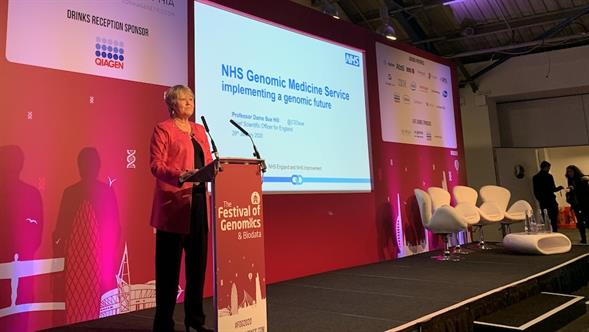
Image credit: Walter Waymann via Pixabay.
London’s annual Festival of Genomics conference brings together a diverse crowd of attendees with a common mission: to deliver the benefits of genomics to people faster.
Genomics is an extremely powerful discipline that is fundamental to understanding and treating diseases like cancer – and it is rapidly evolving.
It differs from ‘genetics’ in studying full genomes – in humans, all of the DNA held in our chromosomes – rather than only the genes, which code the proteins which make up our bodies but only give part of the picture of what our DNA does.
Genomic data has the potential to inform screening, diagnostics and personalised treatment – making it possible to predict and treat cancer more precisely than ever before.
In a recent blog post, we talked about genomic medicine as one of the three key areas with the potential to transform cancer care for the better in the next decade – and the talks given at the Festival of Genomics definitely back this claim.

Professor Dame Sue Hill giving keynote speech.
Moving towards a ‘genomic future’
Professor Dame Sue Hill, Chief Scientific Officer for NHS England, kicked off the festival by introducing the national genomic infrastructure in England, including the NHS Genomics Medicine Service and its plan to implement a ‘Genomic Future' over the next ten years.
The NHS aims to make genomics a routine part of healthcare. Thanks to better technologies allowing scientists to determine people’s entire genetic make-up quickly and cheaply, this is already becoming a reality. As Professor Dame Sue Hill told the audience, the NHS has witnessed a tripling of investment in genomics as a consequence.
So, what are the benefits of routinely offering genomic testing?
Genomic sequencing essentially provides us with an extraordinary set of information that enables us to understand the ‘uniqueness’, medically speaking, of each patient and, for cancer patients, their tumour.
Cancer cells develop their own genomic alterations that drive their growth and spread: gaining understanding of cancer genomes can lead to early diagnosis and preventive measures, and it can help doctors identify a more tailored, ‘personalised’ treatment.
To date, more than 107,000 genomes have been sequenced in the UK research environment, including over 33,000 cancer genomes – meaning that the genetic blueprints of all of these genomes have been decoded.
This has provided us with a vast amount of genomic data which, as well as helping match patients to the best gene-targeted treatments available, could also inform the next wave of drug development and biomarker discovery.
Machine learning to identify patient sub-groups
Large-scale genomic sequencing projects such as the 100,000 Genomes Project have generated a vast amount of information – but what good is this if we can’t make sense out of it? Meaningful analysis is key – and using machine learning and AI algorithms, we can start spotting trends in the data.
The ICR’s Dr Anguraj Sadanandam – our team leader in Systems and Precision Cancer Medicine – gave a talk at the Festival about his work, in which he uses genomic data to pick out subgroups of patients who might respond differently to treatment.
People who seemingly have the same cancer type often respond very differently to drugs. By using genomic data and machine learning algorithms, Dr Sadanandam’s team aims to accurately predict who will respond well to particular treatments, and who will face harmful side-effects after being treated.
Last year, Dr Sadanandam and his team used machine learning approaches to uncover five new sub-types of breast cancer, each matched to different personalised treatments.
By making sense of the genomic data and developing new machine learning approaches to stratify patients, Dr Sadanandam and his team hope to open up new possibilities for treatment in cancers that currently lack effective options.
We are now poised to outsmart cancer with the world’s first anti-evolution 'Darwinian' drug discovery programme, in which we will focus on understanding, anticipating and overcoming cancer evolution, and preventing drug resistance.
Precision prevention for cancer
Genomic data can also be used to assess a person’s risk of developing cancer. The ICR’s Professor Clare Turnbull gave a talk discussing her team’s effort to identify cancer susceptibility genes and understand how these can cause disease.
A study led by Professor Turnbull in 2018, for instance, showed that a mixed set of common, single-letter changes to the DNA code – each of which only slightly increase a man’s risk of testicular cancer – together play the biggest role in causing the disease.
Discoveries like this one can help with counselling people who might be worried about their risk of developing cancer, and could help inform future screening programmes.
In this way, genomics can help pick out people at high risk, to who we can offer interventions to lessen that risk. However, as Professor Turnbull concluded, estimating, acting on and communicating cancer risks is highly complex, and the field has a way to go yet.
The need for genomic counselling
So, as we have seen, genomics is a powerful tool with a tremendous potential to revolutionise cancer care – but until now has largely been used within a research context.
It is now crucial that clinicians and the public start getting ready for the routine use of genomics in the clinic, which comes with a number of psychological and communication challenges – as well issues around consent, since people want to know what their genomic data is being used for.
At the conference, the ICR’s Professor Richard Houlston, who is Head of our Division of Genetics and Epidemiology, talked about the challenges that must be considered before we start sequencing patients’ genomes in routine cancer care. One of such issues is the return of secondary findings.
Secondary findings – also known as incidental findings – are results that provide information about genetic changes unrelated to the initial purpose for testing. The problem with secondary findings is that they may lead to additional stress for patients and their families.
Let’s say Mary gets her genome sequenced because she wants to find out if she is a BRCA mutation carrier. The doctors find out she doesn’t have a BRCA mutation, but instead they discover she has a genetic change that will result in her, almost certainly, developing early-onset Alzheimer's disease. There is nothing Mary can do to avoid this.
How should we communicate and make decisions about secondary findings? Should we communicate them at all? This is an active area of discussion – but what is clear is that by offering genomic counselling, we can help people understand, adapt and adjust to the medical and psychosocial consequences of any type of genomic finding.
In this way, the information gathered can help people understand how their genomic information might affect their lives, as well as their treatment options.
In a recent editorial published in Psycho-Oncology, the ICR’s Professor Ros Eeles provides an overview of genomic testing in oncology and discusses the potential and impact of genetic and genomic counselling, amongst other topics.
At the ICR, Professor Ros Eeles is also leading the 90S study – the first study in the UK to assess whether whole-genome sequencing can be used to screen for a range of genes linked to disease or response to medicines in a primary care setting.
If successful, the initiative could be a key step towards much more routine use of genetic testing to predict and manage patients’ future health in the NHS.
Accelerating translational research
Ultimately, researchers, healthcare teams and patients will have to work together to implement genomic medicine.
Healthcare teams will need to involve patients in dialogues around consent, diagnosis, prognosis and treatment.
At the ICR, scientists and clinicians are already working together to gather genomic data and accelerate vital translational research – which is key to bring genomic discoveries into the clinic.
In this way, we will finally move away from ‘one size fits all’ cancer therapies and towards a more successful, personalised way of treating cancer.